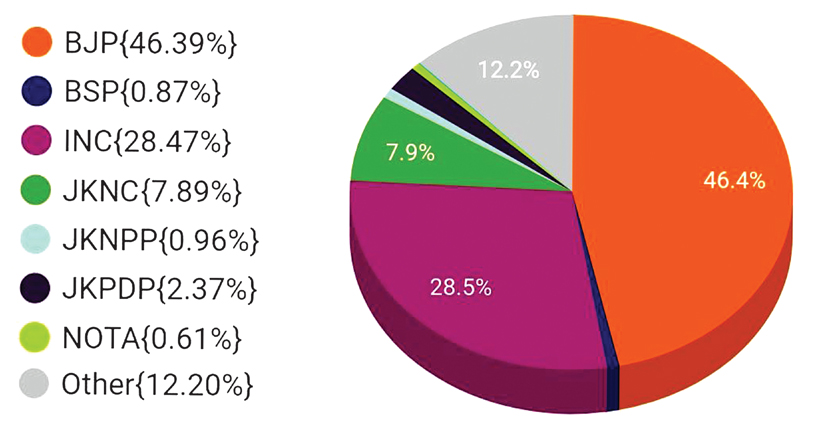Cong gains 6 pc votes but fails to take any seat
Highly polarized polling costs Cong dearly
Sanjeev Pargal
JAMMU, May 25: The BJP has secured an all-time high 46.39 percent votes in Jammu and Kashmir, the bulk of which came from three Parliamentary constituencies of Jammu, Udhampur and Ladakh while the voting percentage of two major mainstream regional political parties-the National Conference and the People’s Democratic Party (PDP) has registered steep decline as compared to 2014 Lok Sabha elections notwithstanding that the NC, like the BJP, won three Lok Sabha seats.
The Congress vote bank in the just concluded Lok Sabha elections in the State also went up by nearly 6 percent but the grand old national party still failed to open its account drawing blank like 2014. The congress didn’t contest Srinagar seat which it had left for NC leader Dr Farooq Abdullah.
Official figures released by the Election Commission of India (ECI) revealed that National Conference polled just 7.89 percent votes in the State but it managed to win all three Lok Sabha seats of Kashmir including Srinagar, Baramulla and Anantnag, all of which had gone to the PDP in 2014.
While the NC won three Parliamentary seats with 7.89 percent votes, the Congress secured 28.4 percent votes but still couldn’t bag even a single seat. This was attributed to extreme low turnout in all three Kashmir constituencies, which the NC won while Congress secured majority of its votes in Jammu and Udhampur Lok Sabha segments, where the turnout was very high, around 70 percent, as compared to around 20 percent in the Valley.
However, the NC votes share declined from around 12 percent in the 2019 general elections as compared to 2014. NC had obtained 19.11 percent votes in 2014 but took just 7.89 percent in 2019, mainly because of low voting percentage this time.
Moreover, the National Conference, like 2014, contested only three seats of Kashmir and supported Congress on two seats of Jammu region and an Independent in Kargil, all of whom lost.
Major gainer in this Lok Sabha election was the BJP, which riding high on Modi wave and development agenda, registered a jump of nearly 14 percent votes from 2014. The BJP polled 46.3 percent votes as against 32.4 percent of 2014 but still it managed to retain the tally of three Lok Sabha seats, like 2014, as its vote share was mainly confined to Jammu, Udhampur and Ladakh Parliamentary constituencies whereas it mustered only negligible number of votes on three seats of Kashmir.
Political observers pointed out that like majority of the States in the country; the election was completely polarized in Jammu region. The support of NC and PDP to Congress candidates on two seats of Jammu and an Independent to Ladakh further consolidated the BJP vote bank and one particular community went all out in favour of Prime Minister Narendra Modi’s nominees. This helped the BJP not only to retain two Lok Sabha seats of Jammu and Udhampur but sharply increased victory margin of the party candidates.
The Congress, observers said, was virtually left on the mercy of NC and PDP votes in Jammu region, which were not enough for it to come even close to the BJP but to say of winning the seats.
“The voting trend on two seats of Jammu region as well as Ladakh constituency, which the BJP won, was reflection of the national sentiment, which was completely in favour of Modi and wanted him to get second term,” the observers pointed out.
Out of a total of 35,43,962 votes polled in Jammu and Kashmir in this election, BJP secured 16,19,992. Significantly from out of 16,19,992 votes, the BJP polled 16,07,439 in Jammu, Udhampur and Ladakh seats which it won with comfortable margin and got just 12,553 votes in three Parliamentary constituencies of the Valley.
Congress polled a total of 10,10,160 votes, National Conference 2,79,340, PDP 1,19,959, BSP 30877 , NPP 28335 and Dogra Swabhiman Front of Choudhary Lal Singh, who himself contested both Lok Sabha seats of Jammu region polled total 26588 votes. However, People’s Conference of Sajjad Lone polled 1,32,655 votes, nearly 13,000 more than the PDP.
It may be mentioned here that Union Minister Dr Jitendra Singh increased his victory margin from 62,000 votes in 2014 to 3.57 lakh in Udhampur seat while his party colleague, Jugal Kishore Sharma raised his margin from 2.57 lakh to 3.02 lakh. BJP candidate in Ladakh Jamyang Tsering Namgayal won the seat with 10,943 votes as against 36 votes victory margin of the party in 2014.
The People’s Democratic Party of Mehbooba Mufti was, of course, the major loser, both in terms of seats as well as vote share in 2019 elections as compared to 2014.
In just concluded Parliamentary polls, the PDP polled just 2.37 percent votes, a steep decline of nearly 18 percent from 2014, when the party had secured 20.5 percent votes and won all three Valley seats.
Significantly, vote share of Others stood at 12.2 percent in Jammu and Kashmir, the third highest after BJP and Congress, which was more than even NC’s 7.89 and PDP’s 2.37 percent.
The Nationalist Panthers Party (NPP), which had won four Assembly seats in Jammu region in 2002, three in 2008 and drew blank in 2014, and the Bahujan Samaj Party (BSP), which once used to be a force to reckon with in Jammu region having won four Assembly seats in 1996, didn’t poll even one percent votes in the elections.
While the NPP secured .96 percent, the BSP managed just .87 percent votes.
The NPP bigwigs, Harshdev Singh and Prof Bhim Singh were in the fray from Udhampur and Jammu Lok Sabha seats and polled just 24319 and 4016 votes respectively.


